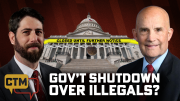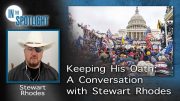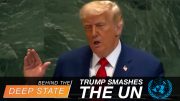During a speech he delivered March 2 at the Conservative Political Action Conference (CPAC), President Trump announced that he would soon issue an executive order “requiring colleges and universities to support free speech if they want federal research dollars.”
“If they want our dollars, and we give it to them by the billions, they’ve got to allow people like Hayden and many other great young people and old people to speak,” Trump told the crowd gathered in National Harbor, Maryland.
The “Hayden” Trump referred to in his speech is Hayden Williams (shown), a young man attacked at the University of California Berkeley where he was appearing in an effort to recruit students for a chapter of the conservative student organization Turning Point USA. In the assault caught on video, a man identified as Zachary Greenberg punched Williams in the face.
“Ladies and gentlemen, he took a hard punch in the face for all of us,” Trump said, after bringing Williams on stage with him.
While many commentators have chimed in, attacking the language they anticipate will be used in the president’s promised executive order, others have focused on the need to prevent political correctness to stifle speech on campuses, particularly in light of the billions of federal aid dollars these universities receive.
The National Review, for example, wrote, speaking of the executive order, “The most morally defensible executive order would apply to recipients of all federal research dollars and would demand protection of core academic freedom for the researcher while respecting institutional mission.”
Adam Kissel, author of the National Review article, muses on the potential scope of the educational edict:
Should the order apply to all institutions, including private religious colleges? What conditions should the order include? How could it be enforced, and how can alleged violations trigger enforcement? Having served in the U.S. Department of Education in 2017 and 2018, and having worked at the Foundation for Individual Rights in Education (FIRE) for five years, I can provide a basic guide to the legal boundaries and tradeoffs involved.
Kissel goes on to advocate for a robust role for the federal government.
“Therefore, pretty much every unacceptable part of a speech code, wherever and to whomever it applies, should be subject to a federal policy protecting academic freedom for students and faculty members,” he writes.
Later, Kissel indicates that he favors abolition of federal agencies, claiming the courts are a more constitutionally sound approach to protecting speech on campus.
All of this acceptance — albeit reluctant — of a president taking out his pen or getting on his phone to issue fiats dictating federal policies should be remarkable, but Republican reaction to President Trump’s open and avowed disregard for the Constitution generally and his oath of office specifically seems almost always supportive.
President Trump, to the dismay of many members of his party, continues to pursue his agenda with an untrammeled tack toward its accomplishment. This is certainly not consistent with the Constitution, the enumerated powers contained therein, and the principle of the separation of powers.
Contrast Trump’s CPAC pronouncement with an executive order he issued on May 4, 2017. Entitled “Presidential Executive Order Promoting Free Speech and Religious Liberty,” the decree revealed the president’s aim of making sure executive branch departments and agencies respect “religious and political speech.” In that prior executive order, the president, claiming he was acting under “the authority vested in [him] as President by the Constitution,” declared:
All executive departments and agencies (agencies) shall, to the greatest extent practicable and to the extent permitted by law, respect and protect the freedom of persons and organizations to engage in religious and political speech. In particular, the Secretary of the Treasury shall ensure, to the extent permitted by law, that the Department of the Treasury does not take any adverse action against any individual, house of worship, or other religious organization on the basis that such individual or organization speaks or has spoken about moral or political issues from a religious perspective, where speech of similar character has, consistent with law, not ordinarily been treated as participation or intervention in a political campaign on behalf of (or in opposition to) a candidate for public office by the Department of the Treasury. As used in this section, the term “adverse action” means the imposition of any tax or tax penalty; the delay or denial of tax-exempt status; the disallowance of tax deductions for contributions made to entities exempted from taxation under section 501(c)(3) of title 26, United States Code; or any other action that makes unavailable or denies any tax deduction, exemption, credit, or benefit.
While the chief executive signing an executive order directing executive branch agencies to respect religious liberty is certainly constitutional, the new executive order aimed at colleges and universitites is not. The president does not have the authority to dictate policies at colleges and universities. Of course, if such educational intitutions were not receiving federal funds in the first place (which is unconstitutional), all of this would be a moot point.
Despite speaking for nearly two hours, President Trump offered no clarification about when he would hand down the new federal free-speech fiat.
What is clear, however, is that if the president usurps this authority, it will be used by a future president to force universities to conform to his conception of what speech should and should not be protected and promoted. How the president and his supporters don’t appreciate that the very (unconstitutional) power he would wield to force acceptance of their idea of “free speech” would be undoubtedly exercised by the next executive is baffling.
As Robby Soave explained in Reason, “It’s not obvious that a presidential order would really address the cultural dimensions of the campus free speech issue. It might, however, worsen a very different problem: executive overreach. Congress, after all, is tasked with funding higher education, not the president.”
According to Soave’s sources, the president has prepared a draft of the executive order and that “the plan is to penalize universities that do not protect free speech by taking away their federal grants.”
I’ll close with words written by the incomparable Thomas Gordon in 1722, describing the despotism that comes when the cure is worse than the disease: “It is certain, that Liberty is never so much in danger, as upon a Deliverance from Slavery. The remaining Dread of the Mischiefs escaped, generally drives, or decoys Men into the same or greater; for then the Passions and Expectations of some, run high; and the Fears of others make them submit to any Misfortunes to avoid an Evil that is over; and both Sorts concur in giving to a Deliverer all that they are delivered from.”
Photo: AP Images




